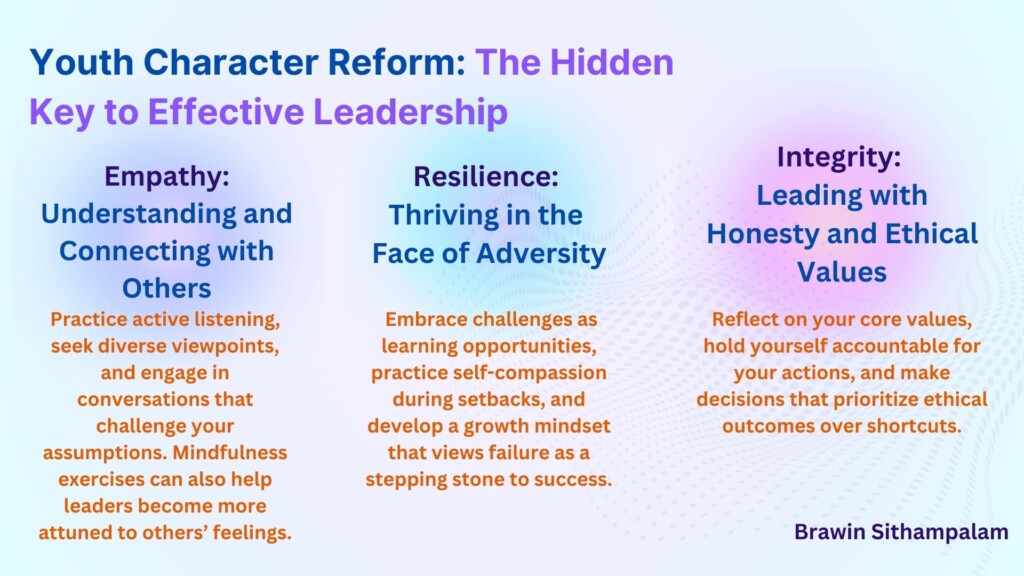Youth Character Reform: The Hidden Key to Effective Leadership

In today’s fast-paced, interconnected world, the demand for effective leadership has never been greater. But what makes a leader truly stand out? While technical skills and expertise are crucial, the foundation of exceptional leadership lies in character. For youth aspiring to lead, character reform isn’t just an added advantage; it’s the hidden key that unlocks their potential to inspire, guide, and create meaningful change.
The Role of Character in Leadership
Character shapes how leaders navigate challenges, treat others, and make decisions. For young leaders, character reform is about developing integrity, empathy, and resilience, all of which contribute to fostering trust and respect among peers and teams. A leader with strong character can adapt to changing environments while staying grounded in their values, a critical quality in our unpredictable world.
Reforming character during youth sets the stage for a lifetime of ethical leadership. By focusing on this formative period, young individuals can cultivate the habits, mindset, and emotional intelligence needed to lead effectively, even in the most challenging circumstances.
Three Key Skills for Youth Character Reform and Leadership
- Empathy: Understanding and Connecting with Others
- Why It Matters: Empathy enables leaders to understand the perspectives and emotions of others, building trust and fostering collaboration.
- How to Develop It: Practice active listening, seek diverse viewpoints, and engage in conversations that challenge your assumptions. Mindfulness exercises can also help leaders become more attuned to others’ feelings.
- Resilience: Thriving in the Face of Adversity
- Why It Matters: Leadership often involves setbacks and criticism. Resilience equips leaders to bounce back, stay focused, and inspire their teams to persevere.
- How to Develop It: Embrace challenges as learning opportunities, practice self-compassion during setbacks, and develop a growth mindset that views failure as a stepping stone to success.
- Integrity: Leading with Honesty and Ethical Values
- Why It Matters: Integrity is the cornerstone of trust. Leaders who consistently act in alignment with their values earn respect and loyalty from their teams.
- How to Develop It: Reflect on your core values, hold yourself accountable for your actions, and make decisions that prioritize ethical outcomes over shortcuts.
Youth Character Reform in Action
Youth character reform isn’t about perfection; it’s about progress. Leaders who actively work on their character inspire others not by their titles or achievements but by their ability to embody the values they preach. This authenticity fosters a culture of trust, innovation, and collaboration, paving the way for sustainable success.
For young leaders, focusing on empathy, resilience, and integrity is the starting point for unlocking their true potential. These skills not only prepare them for leadership roles but also help them create a positive impact on their communities and beyond.
The Path Forward
Investing in youth character reform isn’t just about individual growth; it’s about shaping the leaders of tomorrow who can navigate complexities with courage and compassion. By prioritizing the development of their inner values and focusing on key skills, young people can step into leadership roles ready to inspire change and lead with purpose.
Conclusion
Leadership isn’t simply about strategy or skills; it’s about who you are at your core. By embracing character reform and committing to personal growth, youth can unlock their potential to lead with authenticity and impact. The journey starts today with small, deliberate steps toward becoming the leader you aspire to be.
References
- Kouzes, J. & Posner, B. (2007). The Leadership Challenge: How to Make Extraordinary Things Happen in Organizations.
- Duckworth, A. (2016). Grit: The Power of Passion and Perseverance.
- Brown, B. (2015). Rising Strong.